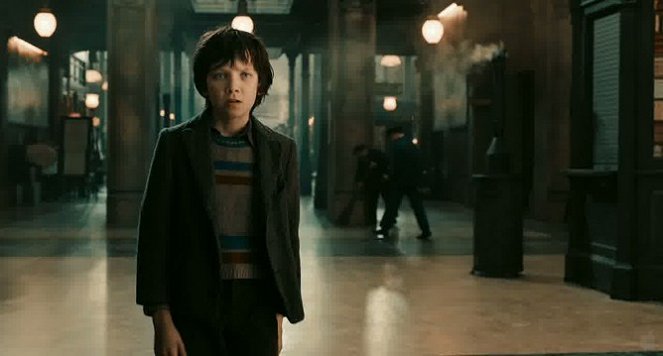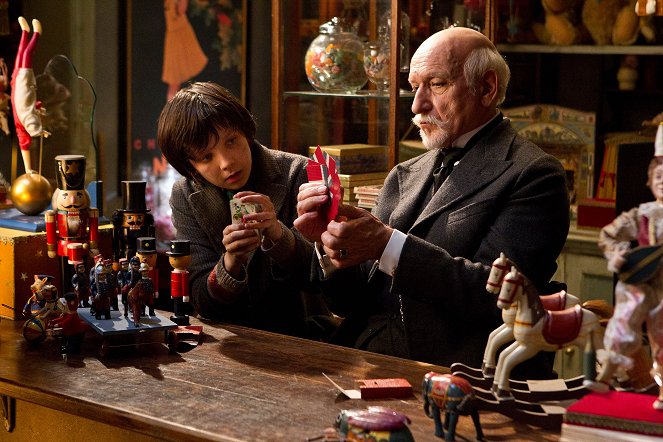Directed by:
Martin ScorseseScreenplay:
John LoganCinematography:
Robert RichardsonComposer:
Howard ShoreCast:
Ben Kingsley, Sacha Baron Cohen, Asa Butterfield, Chloë Grace Moretz, Ray Winstone, Emily Mortimer, Christopher Lee, Helen McCrory, Michael Stuhlbarg (more)VOD (2)
Plots(1)
Based on the award winning children's novel 'The Invention of Hugo Cabret'. Hugo is an orphan boy living in the walls of a train station in 1930s Paris. He learned to fix clocks and other gadgets from his father and uncle which he puts to use keeping the train station clocks running. The only thing that he has left that connects him to his dead father is an automaton (mechanical man) that doesn't work without a special key. Hugo needs to find the key to unlock the secret he believes it contains. On his adventures, he meets George Melies, a shopkeeper, who works in the train station, and his adventure-seeking god-daughter. Hugo finds that they have a surprising connection to his father and the automaton, and he discovers it unlocks some memories the old man has buried inside. (Paramount Pictures AU)
(more)Videos (16)
Reviews (12)
Paradox: the simplest film illusion created in the most technically complex way. A return to the initial astonishment. For me, it’s not closest to The Artist and other parallels presented here, but rather Herzog's Cave of Forgotten Dreams. Even Scorsese tries to return to the magical moment of ecstasy from the world of visions, to the dimension in which the image on the retina changes into the complex world behind it. I spent two hours in the movie theatre in bliss and ecstasy from something that was not and is not. Hugo's value is not in its (factually dubious) encyclopedic teachings, but in the fact that the film teaches us to rejoice in the imagination - not in the stimulating visual expansion that evokes its utter stunting, but in the journey into the interior in which the most beautiful spells are always performed, stimulated by the magic of pen and celluloid masters. I hope that one day I will raise a kid that the anachronistic illusionist Hugo will entertain, even with its embarrassingly romantic (and soothing) vision of the world as a mechanism in which everything has a fixed place...
()
More than just a tribute to the forefather of cinematic brats (weaned and further nourished on the sci-fi, fantasy and horror genres). The web of references to films and filmmakers who were influenced by Meliés and who possibly influenced Scorsese (who came to Meliés through his own spiritual father, Michael Powell) has multiple layers and one viewing is not nearly enough to disentangle them, while the revealing of the central idea, which is underpinned by numerous allusions, is no less entertaining. Film as a mechanical means of reviving memories, bringing people together and creating dreams. Here, only cinematic dreams, not real ones, which have the form of nightmares, serve as a reliable means of escape from reality (we therefore also mainly see examples from Meliés’s special-effects films and less from his reconstructed events). (In the second bad dream, there is a peculiar absence of clocks, i.e. time as a dimension, which mechanical inventions other than film lack). ___ The story isn’t divided into two parts; from the beginning, it’s about repairing a broken machine, with the first part accenting the mechanical level and the second part placing emphasis on the human level. We mainly see the machines first. They are placed in the foreground of the mis-en-scéne and, at the same time, Hugo pins all of his hopes on them. The first part also comes closer to grotesque films, as a human functions as an inanimate, mechanical object. The second part, from the activation of the automaton, is a partial negation of the modernistic enthusiasm over technological progress. Hugo starts to realise that the machines will not change anything about his loneliness. The guard’s mechanical leg, previously used as a source of gags, becomes a means of becoming close to the flower girl, who lost her brother at Verdun (mass slaughter thanks to the use of modern technology). The settings of the action are expanded with the addition of Meliés’s household and library. Books and people get more space. Technology is talked (theorised) about more than it is shown. ___ The mechanical thesis and the human antithesis logically lead to cinematic synthesis, to the joining of reason and emotion as, for example, Jean Epstein wrote about it (La Lyrosophie). The conclusion brings separate “peephole” scenes (gags) like those from early films into the overall narrative. Like the characters, these scenes find their place, their meaning. The film is constructed in such a way that it can result in a film. I cannot imagine a more wonderful tribute to the very idea of moving pictures. ___ The historical inaccuracies that Scorsese allows are easier to criticise than the outwardly atypical plot structure. Viewers’ dodging of the oncoming train can still be tolerated when reading the book by Tabard, who, as it happens, was not accurate in writing about Meliés, but not in Meliés’s own memoirs, which corrected other authorial errors. Meliés did not come across cinema by accident, as he was personally invited to a public film screening by the Lumière brothers and he did not create the camera from nothing, but improved an existing model by R.W. Paul. The decline in interest in his work did not come until the First World War. By about 1909, Meliés’s laborious method had made it simply impossible for him to shoot as quickly as the times demanded and he completed his final film in 1913. However, these details are overshadowed by his incredibly precise revival of old Paris and even older films (several seconds of Le Royaume des fées are memorable). The transfer into 3D gave these a new dimension without diminishing their charm. They are improved, though indirectly, by highlighting their meaning. Scorsese not only proclaims his love for film, but also calls on us not to forget. 90%
()
(less)
(more)
It's a fairy tale, a fairy tale that even adults can go to the cinema and enjoy. Even I enjoyed it; but I still couldn't help feeling like something was missing. What was missing? Suspense. It looked beautiful, you would almost like to go for a walk there, the actors acted, the music worked (of course, I can't remember it anymore, so it must not have been that memorable), but it just didn't flow. Plus, the death of Hugo's father was such an empty thing, it must have happened just so Hugo could go to the station where he met... Plus why did he get the book? Why didn't he get his notebook back? Why was the key in his dream lying in the rocks in one shot and on the railroad track in the next? And why....? I don't know, basically the overall experience was a bit spoiled by all the questions and the unsatisfied longing for the kind of suspense or adventure that makes you forget to breathe. There was nothing in the movie I wouldn't want to forget. It's a beautiful film. Visually well done. But it didn't have to be in 3D, even 2D would have looked great (unfortunately my local cinema only offered it in 3D). I left the cinema a bit disappointed, but I still know I watched a beautiful film aimed at younger viewers. It's a film without violence and a film about fixing things. Just the thing for a gentle soul. If I had a little kid, I'd let him watch it. But I wouldn't watch it with him, I wouldn't join him in front of the TV like I do sometimes when I'm walking by and something interesting is on. I'd be more likely to go do some cleaning instead.
()
A movie about movies for people who like movies. Nothing earth-shattering in terms of story, but Marty reminds me of Méliès himself in terms of technical implementation and eye for detail. The same applies to the old captivating images hidden throughout the picture. Movies used to be a way of creating dreams, while today the audience wants to see reality. And isn’t there enough room for both?
()
Martin and his big movie. Not his best, but undeniably his most personal. Here Scorsese (Hugo is him) professes his lifelong love of stories in the form of a melancholic kids’ movie which isn’t so much for kids, after all. And in addition to this he was the first to prove that 3D has its rightful place in cinema, where it can be something more than a mere good-looking bolt-on. Mainly and primarily this is a darn good movie; and that is all that is important in the end.
()


